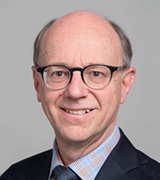J. Geoffrey Pickering

Professor
Departments of Medicine, Biochemistry, and Medical Biophysics
Why I Became a Scientist
I trained as both a cardiologist and a scientist. I became a clinician-scientist because of my interest and recognition that the problems faced by individuals with heart disease must be addressed not only by existing treatment strategies but by gaining a better understanding of the cell and molecular basis for the disease.
Research Summary
Our work involves the identification of pathways by which cells of the artery wall contribute to vascular disease. This includes studying the diverse behaviour patterns of the vascular smooth muscle cell. Our laboratory has international prominence in the field of smooth muscle cell motility and interactions with the extracellular matrix as well as vascular stabilization.
We are currently one of the few groups capable of cloning smooth muscle cells from human arteries and we generated the first, and to date only, smooth muscle cell lines that have the capacity to reversibly convert between a contracting (healthy) and noncontracting (diseased or repairing) state. This has led to the discovery of novel genes involved in vascular remodeling. Determining the role of these genes in vascular disease is a major direction of the lab.
Another focus is to understand, at a molecular level, how the vascular system ages. Accelerated aging of blood vessels leads to heart disease and stroke. We also investigate novel strategies for the development of new blood vessels (angiogenesis).
https://www.ahajournals.org/toc/res/120/12
Research Questions
Can we extend the productive lifespan of vascular cells?
The ability of vascular cells to retain their functions as we age is essential for cardiovascular health. Avoiding high blood pressure, heart attacks, strokes, and improving recovery following stenting and bypass surgery, requires that vascular cells do not age faster than the rest of the body. We have discovered novel pathways that slow vascular cell aging.
How do vascular cells communicate with extracellular matrix?
Heart attacks and strokes develop when the structure of atherosclerotic plaques break down. Understanding how to develop a stable, collagen-rich extracellular matrix is critical to stabilizing vulnerable plaques and preventing the dire consequences of their rupture. We are studying novel pathways that improve and stabilize the interactions between cells and collagen.
How can endothelial cells and vascular smooth muscle cells interact to regenerate new blood vessels in diseased hearts?
When hearts become starved of oxygen they attempt to generate new blood vessels. However this process is often not successful because the new blood vessels are thin-walled and unstable. By regenerating durable blood vessels that have all cell layers, new strategies for managing heart disease can be developed.
Education
- M.D., Faculty of Medicine, Queen's University, Kingston, Ontario
- Ph.D., Department of Medical Biophysics, University of Western Ontario, London, Ontario
- Specialty Certification (FRCP(C)) in Internal Medicine and Cardiology
Training
- Internal Medicine Residency, University of Toronto
- Internal Medicine Certification and Fellowship, Royal College of Physicians and Surgeons of Canada
- Cardiology Residency, University of Western Ontario
- Cardiology Certification by Royal College of Physicians and Surgeons of Canada
- Cardiology Research Fellow, University of Western Ontario
- Post-Doctoral Training, Tufts University School of Medicine, Boston, MA
Awards
- Heart and Stroke Foundation of Ontario / Barnett-Ivey Chair
- Queen's Honour Matriculation Award
- Ivan Smith Scholarship
- W.W. Near and Susan Near Special Scholarship
- Rueben Wells Leonard Penultimate Year Scholarship, Queen's University
- Research Fellowship, Canadian Heart Foundation
- Detweiler Travel Fellowship, Royal College of Physicians and Surgeons of Canada
- Research Fellowship, Medical Research Council of Canada
- Young Investigator Award, Canadian Cardiovascular Society
- Research Scholarship, Medical Research Council of Canada
- Premier's Research Excellence Award
- Operating Grants: Heart and Stroke Foundation & Canadian Institutes of Heath Research
- University Students' Council Teaching Honour Roll Award of Excellence
- Department of Medicine Research Award of Excellence
- University of Western Ontario, Faculty of Medicine and Dentistry, Dean’s Award of Excellence in Research
- Career Investigator Award, Heart and Stroke Foundation of Ontario
- Fellow, American Heart Association
- Fellow, American College of Cardiology
- Senior Investigator Award, Hypertension Canada
- Tony Graham Award for Excellence in Board Service, Heart and Stroke Foundation
- Luis G. Melo Memorial Lecturer in Molecular Cardiology, Queen's University
- WORLDiscoveries Vanguard Award
- Western Alumni of Distinction Award - Excellence in Basic Science Research
- Ken Bowman Research Achievement Award, Institute of Cardiovascular Sciences, University of Manitoba
- Fellow of the Canadian Academy of Health Sciences (CAHS), Induction Ceremony in Vancouver, BC
Publications
Contact Info
Phone: 519-663-3973
Email: gpickering@robarts.ca
Research Administrative Assistant: Deborah Andersen
Phone: 519-931-5777 x25718
Email: dander28@uwo.ca
Medical Administrative Assistant: Cara Brown
Phone: 519-663-3973
Email: cara.brown@lhsc.on.ca








